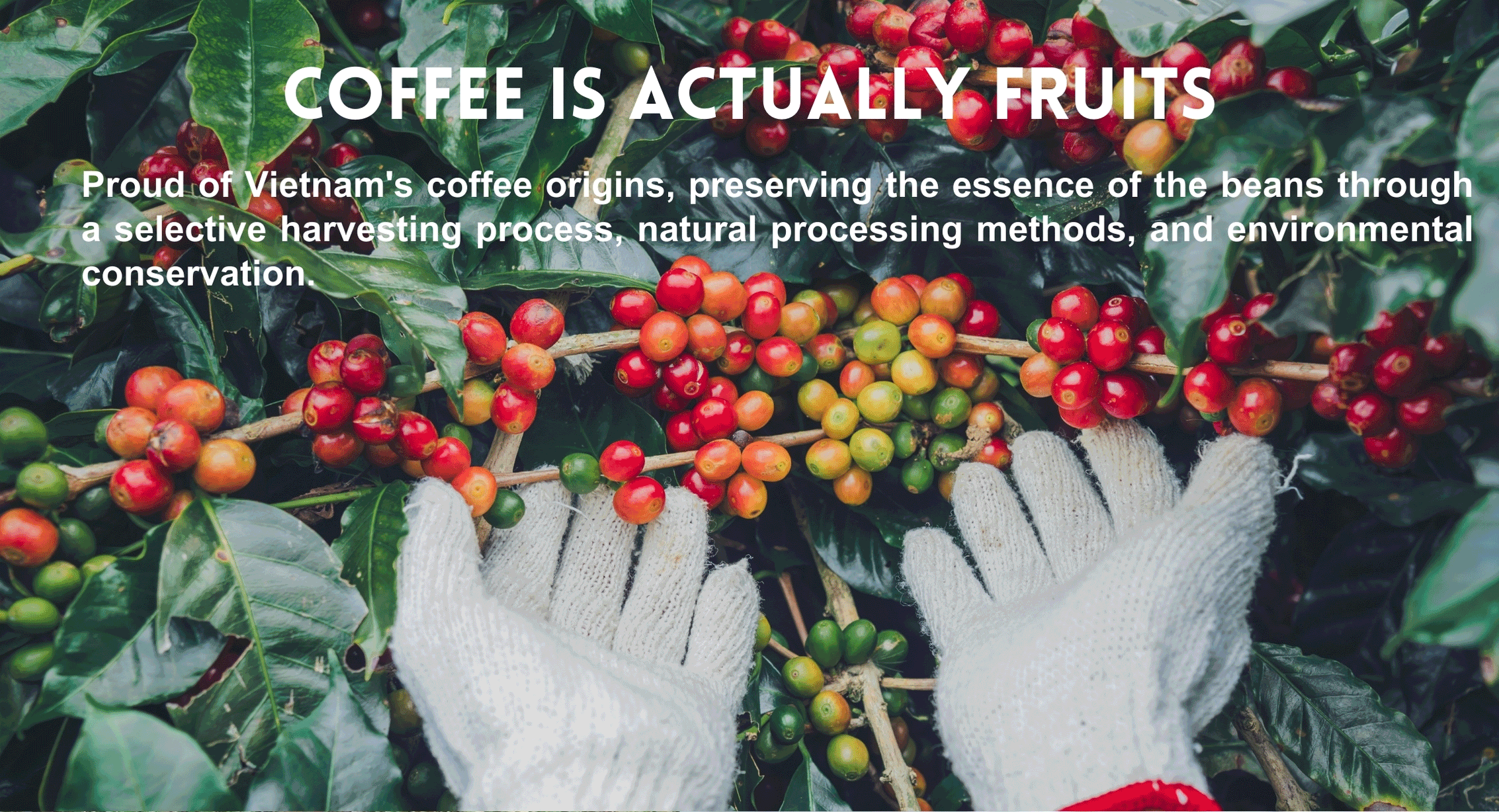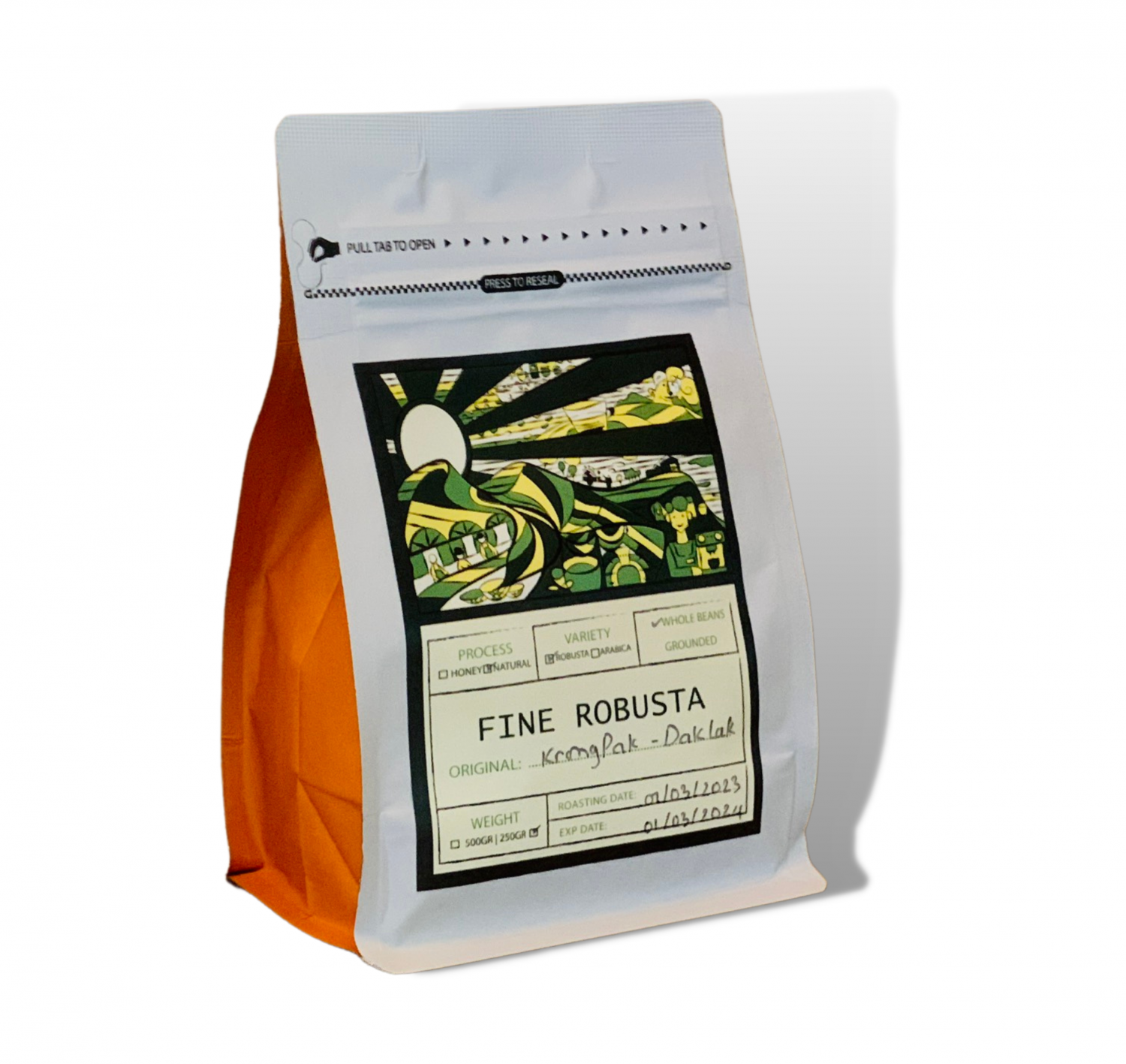
The Espresso Farm
The superior strength from the Robusta Đaklak raw material region
Amidst the vast coffee forests, this place boasts fertile red basalt soil and a temperate climate, making it one of the finest Robusta raw material regions in Daklak, The Espresso Farm chose to start right in the heart of Vietnam's coffee cradle.
With the grand objective of enhancing the quality of Vietnamese Robusta beans, we focus on selecting raw materials from long-standing Rô Sẻ coffee gardens. We employ Specialty Coffee processing technology and techniques to produce premium green beans for both the domestic and export coffee markets. The processing model is designed based on Israel's vertical convection technology, utilizing anaerobic fermentation and the natural drying method known as Natural, ensuring a completely clean and environmentally friendly process. Therefore, at The Espresso Farm, you can witness the landscape of a modern green coffee bean production process amidst lush, fresh, and pristine nature!
Fine Robusta – a testament to this belief
"Well-produced Robusta can taste better than poorly produced Arabica" (Excerpt from The World Atlas of Coffee – James Hoffmann))
By employing selective methods and advanced processing techniques, we can elevate the unique aroma and flavor profile inherent in Robusta coffee beans to unprecedented levels, shattering preconceptions about their "inferior taste" compared to other beans. Moving forward, Robusta will no longer be relegated solely to industrial use in the coffee industry but will instead be savored and appreciated on par with Arabica, offering an experience that is equally satisfying.
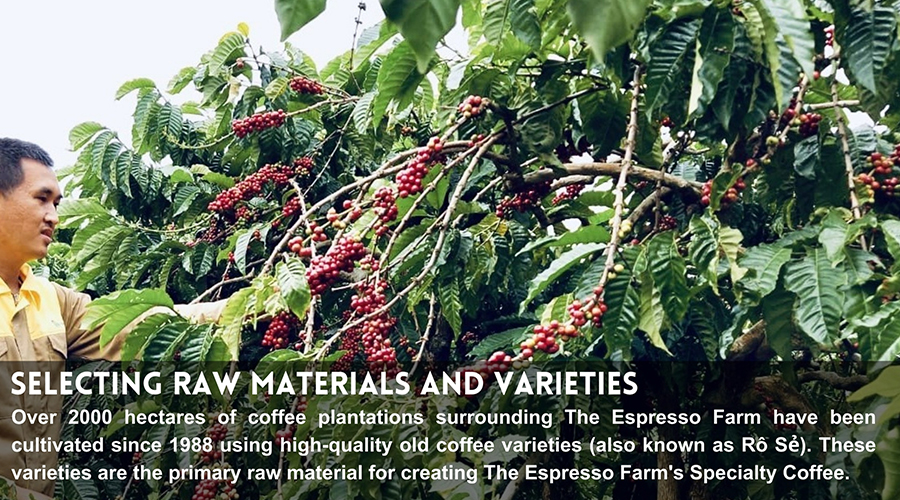
Selecting quality from the source region and variety
Buôn Ma Thuột, with an average elevation of 500 to 700 meters, a tropical climate with abundant monsoon winds and rainfall, and red basaltic soil from volcanic mountains, provides excellent natural conditions for Robusta coffee trees. Over 2,000 hectares of coffee gardens surround The Espresso Farm, planted since 1988 with high-quality old strains (known as Rô Sẻ). The coffee trees grow under the shade of tall, 20-30-meter-high jackfruit trees, with ages ranging over 15 years, serving as the primary raw material for The Espresso Farm's Specialty Coffee.
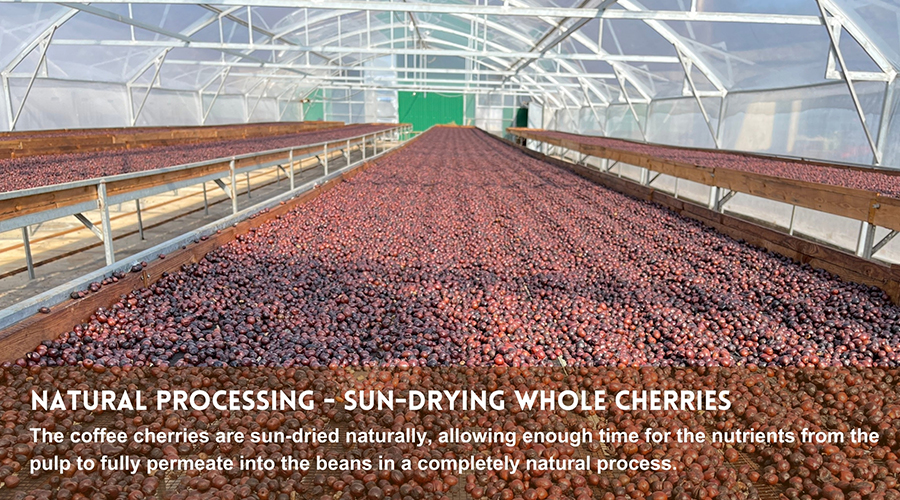
Natural processing - preserving natural value and the environment
By utilizing an Israeli greenhouse system with active convection fans, coffee cherries are naturally sun-dried, allowing sufficient time for the nutrients from the pulp to fully permeate into the beans in a completely natural manner. The elevated drying system prevents contact with soil, dirt, or insects, ensuring a safe and hygienic automated operation. This process generates zero hazardous waste, odor, or dust, making it entirely safe for both consumers and workers at The Espresso Farm while being environmentally friendly.
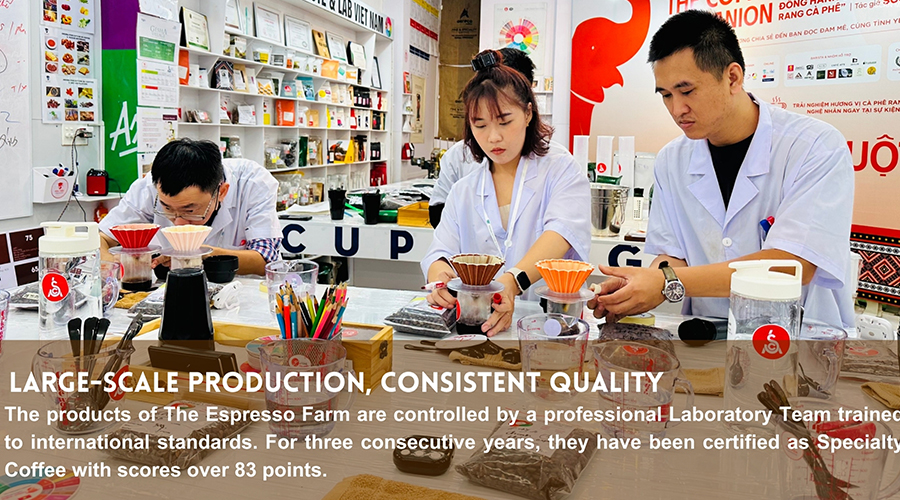
Large output, consistent quality
With a vast scale spanning over 5,000 square meters nestled within thousands of hectares of coffee forests, The Espresso Farm ensures stable output based on direct contractual agreements with farmers. The processing system at The Espresso Farm employs advanced machinery in conjunction with active convection greenhouses to control temperature and humidity, resulting in large yields and consistent product quality. The products of The Espresso Farm undergo rigorous quality control by a professional lab team trained to international standards, achieving Specialty Coffee certification with scores exceeding 82 points for two consecutive years.
RENOWNED RAW MATERIAL REGION IN DAKLAK
VIETNAM'S ROBUSTA COFFEE CAPITAL
COFFEE PRODUCTION FACILITY AREA
HIGH-QUALITY ROBUSTA GREEN BEANS PRODUCTION.
NATURAL PROCESSING WITHOUT ENVIRONMENTAL WASTE DISCHARGE.
SPECIALTY COFFEE NATIONWIDE.
The journey of coffee beans
From the blossoming of its flowers to the formation of enticing beans, coffee undergoes a long and arduous journey before it becomes a captivating beverage. That's why coffee never ceases to be intriguing and alluring, continually expanding its horizons and richness through exploration and development. But what exactly is the journey of a coffee bean like?

Care's
A young coffee plant, from seedling to suitable planting condition, requires about 9-12 months of careful nurturing in the nursery. Following this, it takes approximately 3 years of care for the tree to start bearing fruit for the first harvest. Each year, the care process, including weeding, watering, fertilizing, etc., spans over 9 months until the fruits ripen and are ready for harvesting.

Harvesting
"The harvesting stage is the most joyful moment for farmers, yet it's also the toughest period for a coffee crop. At The Espresso Farm, we meticulously inspect each plantation to assess the ripeness of the cherries; only when they reach optimal ripeness do we commence harvesting. Harvesting ripe cherries is labor-intensive and challenging, especially during the rainy season in Buôn Ma Thuột. Our raw material coffee gardens consist of old trees, Rô Sẻ varieties, producing small cherries with a prolonged ripening period, making harvesting even more demanding. However, the quality of the beans is exceptional, boasting rich and flavorful profiles."

Selection
To select the ripest and freshest cherries for processing, harvested coffee must undergo a floating wash process to separate damaged, defective, insect-infested, or impure cherries. Coffee meeting processing standards consists of firm, plump cherries with both beans fully developed, ripe, and thoroughly washed, to the extent that they can be conveniently popped into the mouth to experience the natural sweetness with a hint of the fruit's gentle bitterness.

Fermentation & Drying
Ripe coffee cherries are meticulously washed, drained, and placed in specialized bags for anaerobic fermentation. This stage typically lasts 2-3 days, allowing the natural sugars within the cherry pulp to undergo transformation, imparting the extraordinary flavors of Fine Robusta beans that were difficult to imagine years ago: wine-like notes, ripe fruit aromas such as passion fruit and jackfruit, hints of dried nuts, and even spices like cinnamon and pepper. This phase is crucial in crafting the unique flavor profile of Fine Robusta. Once the cherries have reached the desired fermentation standards, they are dried in greenhouses on raised beds positioned 90cm above the ground. The convection greenhouse technology utilized by The Espresso ensures even and slow natural drying under the sunlight. During this period, the cherries seem to "absorb all the essence of nature, embodying both the sun and wind of the highlands within themselves.".

Storage
"Storage after drying is an extremely crucial stage. Coffee beans with the right moisture content are stored in sealed nylon bags to prevent moisture absorption and insect infestation. Coffee can be stored for 3-6 months before it is ready for use. At The Espresso Farm, to ensure the quality of the beans, coffee is stored with its parchment intact and is only hulled right before it is transferred for roasting."

Cupping
"Cupping," also known as coffee tasting, is a process used to evaluate the quality of coffee. Through cupping, various defects in processing (such as faulty fermentation, inadequate washing, or the presence of dirt), harvesting (such as the ratio of underripe, overripe, or insect-damaged beans), roasting, and other factors can be detected. Criteria are established based on these evaluations and are translated into scoring standards for coffee. Specialty Coffee is coffee produced according to Specialty Coffee processing standards and is scored by the Coffee Quality Institute (CQI) with scores of 80 points or above. The Espresso Farm is proud to have received Specialty Coffee certification with high scores in Vietnam for two consecutive years: 83.16 points.
Good coffee originates from high-quality beans and clean processing.
100% Clean, High-Quality Product
The beans are produced from ripe coffee cherries that are carefully harvested and thoroughly washed, removing all defective beans, such as insect-damaged, overripe, and dried beans, still on the tree.
Modern, eco-friendly, and safe drying process
The entire drying system is designed to be elevated 90 cm above the ground, housed in a greenhouse with cement flooring, ensuring that the coffee beans dry naturally under sunlight in a clean environment, without coming into contact with soil, insects, or harmful bacteria.
Environmental Protection and Sustainability
The processing procedure utilizes clean water from a borehole well over 70 meters deep for washing the cherries. After washing, the water is reused for irrigation purposes in the farm's landscaping, ensuring zero discharge of waste into the environment.
Strict Preservation Procedure
After completing the drying process, the coffee is brought back for storage with the parchment intact to ensure the best protection for the quality of the beans inside. Hulling is carried out when the coffee has spent enough time in storage and is then transported to the roastery after being screened to remove impurities, double-packed in specialized nylon bags, and sealed with standard woven sacks.
REPUTABLE PARTNERS
The Espresso Farm highly values its partnerships with:
INTENSO - THỜI ĐẠI COFFEE - KPAN ROASTERY - FINE ROBUSTA INSTITUTE
Documents
Leveraging deep partnerships with national research institutes and professional organizations, The Espresso Vietnam collaborates to strengthen, organize, and enhance research investments across the entire supply chain.
Scientific documents on cultivation, harvesting, processing, fermentation, drying, processing, and environmental treatment for sustainable coffee production are available for free download.

